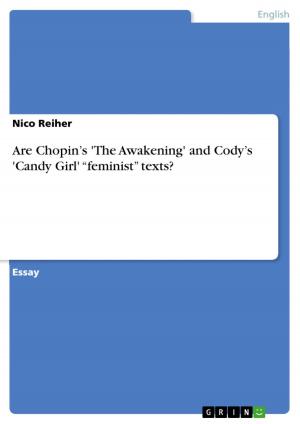The Creation of the American mass market and consumer culture
Nonfiction, Reference & Language, Language Arts, Journalism| Author: | Michael Schmid | ISBN: | 9783638595520 |
| Publisher: | GRIN Publishing | Publication: | January 12, 2007 |
| Imprint: | GRIN Publishing | Language: | English |
| Author: | Michael Schmid |
| ISBN: | 9783638595520 |
| Publisher: | GRIN Publishing |
| Publication: | January 12, 2007 |
| Imprint: | GRIN Publishing |
| Language: | English |
Essay from the year 2004 in the subject Communications - Journalism, Journalism Professions, grade: 1,0, Indiana University (School of Journalism), course: Journalism J650, 5 entries in the bibliography, language: English, abstract: Robert A. Gross begins his article Markets, Magazines, and More with reference to a quote from Ellen Gruber Garvey's book The Adman in the Parlor: Magazines and the Gendering of Consumer Culture which summarizes quite well the essential reason behind many developments that led to the creation of an American mass market. 'Why...do men make magazines? To sell ad. space in them. What's a magazine? So many pages of ad. space.' According to Gross magazines were not so much about content as they were about the advertisements in them. Of course, magazines had to be sold in order for people to read the ads, but the content of the magazine was not designed to improve the reader's life but to get him interested in the product and eventually make him buy it. Many scholars such as William Leach see this development in the American media landscape from a purely informational and even missionary character to a consumption and marketing based arena as a major move away from the traditional values of media outlets such as the newspaper and others. Leach evaluates this change in his book The Land of Desire where he takes a close look at the changes within the American culture and market. He argues that in the decades after the Civil War 'American capitalism began to produce a distinct culture, unconnected to traditional family or community values, to religion in any conventional sense, or to political democracy. It was a secular business and market-oriented culture [...].' He traces this change from the time of the Protestant settlers and early American community life, where the ultimate fulfilment was salvation, spiritual blessings for all and an end to poverty, to the 1900s, where those religious ideals were increasingly transformed and commercialized into personal satisfaction and individual pleasures and profit. With the appearance of 'new pleasure palaces' such as department stores, theaters, restaurants, hotels, dance halls, and amusement parks Americans experienced the joy of personal satisfaction. Whereas in the past, Leach writes, 'values had taken their character from ... the church; now they were deriving it from business and consumption.' This democratization of individual desire of the post Civil War culture is probably one of the 'most notable contributions to modern society' according to Leach.
Essay from the year 2004 in the subject Communications - Journalism, Journalism Professions, grade: 1,0, Indiana University (School of Journalism), course: Journalism J650, 5 entries in the bibliography, language: English, abstract: Robert A. Gross begins his article Markets, Magazines, and More with reference to a quote from Ellen Gruber Garvey's book The Adman in the Parlor: Magazines and the Gendering of Consumer Culture which summarizes quite well the essential reason behind many developments that led to the creation of an American mass market. 'Why...do men make magazines? To sell ad. space in them. What's a magazine? So many pages of ad. space.' According to Gross magazines were not so much about content as they were about the advertisements in them. Of course, magazines had to be sold in order for people to read the ads, but the content of the magazine was not designed to improve the reader's life but to get him interested in the product and eventually make him buy it. Many scholars such as William Leach see this development in the American media landscape from a purely informational and even missionary character to a consumption and marketing based arena as a major move away from the traditional values of media outlets such as the newspaper and others. Leach evaluates this change in his book The Land of Desire where he takes a close look at the changes within the American culture and market. He argues that in the decades after the Civil War 'American capitalism began to produce a distinct culture, unconnected to traditional family or community values, to religion in any conventional sense, or to political democracy. It was a secular business and market-oriented culture [...].' He traces this change from the time of the Protestant settlers and early American community life, where the ultimate fulfilment was salvation, spiritual blessings for all and an end to poverty, to the 1900s, where those religious ideals were increasingly transformed and commercialized into personal satisfaction and individual pleasures and profit. With the appearance of 'new pleasure palaces' such as department stores, theaters, restaurants, hotels, dance halls, and amusement parks Americans experienced the joy of personal satisfaction. Whereas in the past, Leach writes, 'values had taken their character from ... the church; now they were deriving it from business and consumption.' This democratization of individual desire of the post Civil War culture is probably one of the 'most notable contributions to modern society' according to Leach.















